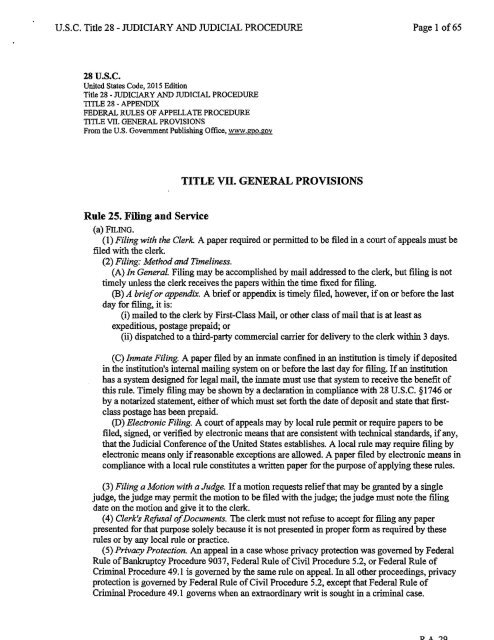Bausch and Lomb_Opposition_2_RamirezWritofCert_2017-03-14
You also want an ePaper? Increase the reach of your titles
YUMPU automatically turns print PDFs into web optimized ePapers that Google loves.
IT A 1 0<br />
U.S.C. Title 28- JUDICIARY AND JUDICIAL PROCEDURE P a g e 1 of 65<br />
28 U.S.C.<br />
United States Code, 2015 Edition<br />
Title 28 - JUDICIARY AND JUDICIAL PROCEDURE<br />
TITLE 28- APPENDIX<br />
FEDERAL RULES OF APPELLATE PROCEDURE<br />
TITLE VII. GENERAL PROVISIONS<br />
From the U.S. Government Publishing Office, www.upo.uov<br />
TITLE VII. GENERAL PROVISIONS<br />
Rule 25. Filing <strong>and</strong> Service<br />
(a) FILING.<br />
(1) Filing with the Clerk A paper required or permitted to be filed in a court of appeals must be<br />
filed with the clerk.<br />
(2) Filing: Method <strong>and</strong> Timeliness.<br />
(A) In General. Filing may be accomplished by mail addressed to the clerk, but filing is not<br />
timely unless the clerk receives the papers within the time fixed for filing.<br />
(B) A brief or appendix. A brief or appendix is timely filed, however, if on or before the last<br />
day for filing, it is:<br />
(i) mailed to the clerk by First-Class Mail, or other class of mail that is at least as<br />
expeditious, postage prepaid; or<br />
(ii) dispatched to a third-party commercial carrier for delivery to the clerk within 3 days.<br />
(C) Inmate Filing. A paper filed by an inmate confined in an institution is timely if deposited<br />
in the institution's internal mailing system on or before the last day for filing. If an institution<br />
has a system designed for legal mail, the inmate must use that system to receive the benefit of<br />
this rule. Timely filing may be shown by a declaration in compliance with 28 U.S.C. §1746 or<br />
by a notarized statement, either of which must set forth the date of deposit <strong>and</strong> state that firstclass<br />
postage has been prepaid.<br />
(D) Electronic Filing. A court of appeals may by local rule permit or require papers to be<br />
filed, signed, or verified by electronic means that are consistent with technical st<strong>and</strong>ards, if any,<br />
that the Judicial Conference of the United States establishes. A local rule may require filing by<br />
electronic means only if reasonable exceptions are allowed. A paper filed by electronic means in<br />
compliance with a local rule constitutes a written paper for the purpose of applying these rules.<br />
(3) Filing a Motion with a Judge. If a motion requests relief that may be granted by a single<br />
judge, the judge may permit the motion to be filed with the judge; the judge must note the filing<br />
date on the motion <strong>and</strong> give it to the clerk.<br />
(4) Clerk's Refusal of Documents. The clerk must not refuse to accept for filing any paper<br />
presented for that purpose solely because it is not presented in proper form as required by these<br />
rules or by any local rule or practice.<br />
(5) Privacy Protection. An appeal in a case whose privacy protection was governed by Federal<br />
Rule of Bankruptcy Procedure 9<strong>03</strong>7, Federal Rule of Civil Procedure 5.2, or Federal Rule of<br />
Criminal Procedure 49.1 is governed by the same rule on appeal. In all other proceedings, privacy<br />
protection is governed by Federal Rule of Civil Procedure 5.2, except that Federal Rule of<br />
Criminal Procedure 49.1 governs when an extraordinary writ is sought in a criminal case.

















